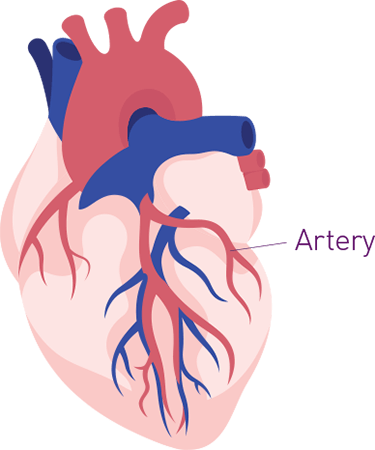
A heart attack happens when one or more of the arteries of your heart become blocked. This causes your heart to not get enough oxygen. It's important to understand that your heart attack may not be a one-time event. Despite the fact that you've survived a heart attack, you're at an even higher risk of having another. With the right medications and lifestyle changes, you can help reduce your risk of another heart attack or dying from one.

Your heart has three major arteries. While in the hospital, blood flow may have been restored in the artery where your heart attack occurred. But a heart attack can happen again in any one of the arteries of your heart. That’s why it’s important to help protect yourself with the treatments your doctor prescribed and make lifestyle changes.


Patient age
Medical history
Health conditions
Severity of heart attack

According to the American Heart Association, about every 2.6 minutes in the US, a heart attack survivor has another heart attack.

BRILINTA is used to lower your chance of having, or dying from, a heart attack or stroke, but BRILINTA (and similar drugs) can cause bleeding that can be serious and sometimes lead to death. Instances of serious bleeding, such as internal bleeding, may require blood transfusions or surgery. While you take BRILINTA, you may bruise and bleed more easily and be more likely to have nosebleeds. Bleeding will also take longer than usual to stop.
Call your doctor right away if you have any signs or symptoms of bleeding while taking BRILINTA, including: severe, uncontrollable bleeding; pink, red, or brown urine; vomit that is bloody or looks like coffee grounds; red or black stool; or if you cough up blood or blood clots.
Do not stop taking BRILINTA without talking to the doctor who prescribes it for you. People who are treated with a stent, and stop taking BRILINTA too soon, have a higher risk of getting a blood clot in the stent, having a heart attack, or dying. If you stop BRILINTA because of bleeding, or for other reasons, your risk of a heart attack or stroke may increase. Tell all your doctors and dentists that you are taking BRILINTA. To decrease your risk of bleeding, your doctor may instruct you to stop taking BRILINTA 5 days before you have surgery. Your doctor should tell you when to start taking BRILINTA again, as soon as possible after surgery.
Take BRILINTA and aspirin exactly as instructed by your doctor. In most cases, you should not take a dose of aspirin higher than 100 mg daily because it can affect how well BRILINTA works. Tell your doctor if you take other medicines that contain aspirin. Do not take new medicines that contain aspirin.
Do not take BRILINTA if you have a history of bleeding in the brain, are bleeding now, or are allergic to ticagrelor or any of the ingredients in BRILINTA.
Slow heart rhythm has been reported with BRILINTA.
BRILINTA can cause serious side effects, including bleeding, shortness of breath, and irregular breathing. Call your doctor if you have new or unexpected shortness of breath or irregular breathing, or any side effect that bothers you or does not go away. Your doctor can decide what treatment is needed.
Tell your doctor about all the medicines you take, including prescription and over-the-counter medicines, vitamins, and herbal supplements. BRILINTA may affect the way other medicines work, and other medicines may affect how BRILINTA works. Tell your doctor if you are breastfeeding or plan to breastfeed. You should not breastfeed while being treated with BRILINTA.
Please read Medication Guide and Prescribing Information, including Boxed WARNINGS, for BRILINTA.
You may report side effects related to AstraZeneca products .